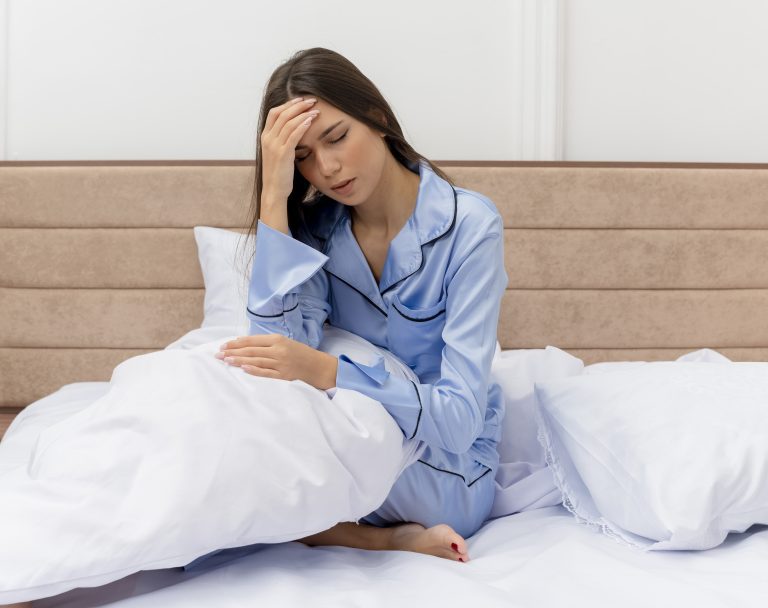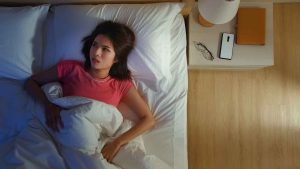
As the world gradually emerges from the grips of the COVID-19 pandemic, a new challenge continues to afflict many individuals who have recovered—the lingering effects of COVID insomnia. Sleep problems after COVID-19 are more common than we may think and can affect our well-being and recovery. This article explores the prevalence and causes of COVID insomnia in the post-pandemic era. Our main focus is to provide practical tips to help individuals navigate sleep problems after recovering, empowering them to regain restful nights and embrace a healthier future.
What is COVID Insomnia?
According to Sleep Foundation, COVID insomnia, also known as Coronasomnia, refers to the increased sleep problems experienced during the COVID-19 pandemic, accompanied by symptoms of anxiety, depression and stress. While insomnia is typically associated with anxiety and depression, Coronasomnia distinguishes itself by being specifically related to the pandemic. Coronasomnia is colloquial rather than an official or medical term, acknowledging that sleep issues during the pandemic stem from various factors beyond just contracting the SARS-CoV-2 virus.
In the early stages of the pandemic, researchers examined the effects of lockdowns on sleep patterns, revealing that while people slept more during lockdown, the quality of their sleep suffered. As the understanding of COVID-19 progressed, data started to shed light on how the virus itself impacts sleep. According to a study in China, around 26% of COVID-19 patients continued to experience insomnia symptoms even two weeks after hospital discharge. Additionally, US research revealed that individuals who have been infected with COVID-19 are more likely to experience sleep difficulties, even up to a month after testing positive.
Understanding Long COVID Insomnia
Long COVID, a condition where symptoms persist beyond the acute phase of the infection, often brings about persistent sleep problems for those affected. A study from 2021 revealed that nearly 80% of individuals with long COVID self-reported sleep issues, with insomnia being the most common complaint. Research also indicates that individuals with long COVID tend to experience less overall sleep and reduced deep sleep compared to those who have not had COVID. This loss of deep sleep is concerning as it contributes to feelings of fatigue, impacts concentration and memory, and may be associated with the reported ‘brain fog’ commonly experienced by long-haulers. Furthermore, disrupted sleep in long COVID patients is a cause for concern, as sleep plays a vital role in supporting the immune system’s ability to combat infections.
What are the underlying causes of COVID Insomnia?
Throughout the COVID-19 pandemic, numerous studies have highlighted the increased prevalence of insomnia and mental health disorders. Rates of sleep maintenance insomnia, characterised by difficulty staying asleep, rose from 24% pre-pandemic to 40% during the pandemic. Similarly, sleep onset insomnia, involving difficulty falling asleep, increased from 15% to 42%. Experts estimate an overall 37% increase in insomnia cases compared to before the pandemic. So, what exactly are the underlying causes of Coronasomnia? Below are some of the intricate ways in which the pandemic has affected our sleep patterns:
- Irregular daily routine
- Heightened stress
- Impact of COVID-19 symptoms (i.e. Shortness of breath, persistent coughing)
- Altered circadian rhythm
- Social isolation
- Mental health decline
Who is at a higher risk of suffering from Coronasomnia?
Beyond those who were infected by COVID-19, another group of individuals who faced disrupted sleep during the pandemic were healthcare workers. The demanding nature of their work took a toll on their well-being, resulting in widespread sleep problems. In the early stages of the pandemic, studies revealed that more than 70% of medical workers experienced significant sleep difficulties. As the pandemic progressed, subsequent research showed that over 30% of healthcare workers continued to be impacted by sleep problems. Another group that was affected were children. Children were another group affected by sleep difficulties during the pandemic. Sleep experts have highlighted how shifting school routines, reduced social interaction, and increased screen time are among the potential causes contributing to sleep problems in children.
What are the symptoms of Coronasomnia?
For many individuals, the symptoms of COVID insomnia surfaced or intensified during the pandemic. COVID insomnia involves various factors that can disrupt sleep due to the impact of the pandemic, ultimately affecting our overall well-being. Common symptoms of COVID insomnia or Coronasomnia include:
- Difficulty falling asleep or staying asleep
- Delayed bedtime schedules
- Elevated stress levels
- Increased symptoms of anxiety and depression
- Daytime sleepiness
- Weakened cognitive function
- Unstable emotional well-being
How to manage sleep difficulties after COVID
If you’re experiencing post-COVID or post-pandemic sleep problems, rest assured that there are strategies to restore healthy sleep patterns and overcome these challenges. Here are some practical tips to help you navigate and manage sleep difficulties after COVID.
- Exercise regularly. Staying physically active is linked to better sleep quality and improved mental health.
- Get your daily dose of sunlight. Exposure to natural light for at least 30 minutes, ideally in the morning, promotes a healthy circadian rhythm, which can contribute to improved sleep.
- Keep a sleep diary. Tracking your sleep timing and quality with a sleep diary enables you to identify potential issues and optimise your sleep.
- Reestablish your routines. Revisit your day and night routines pre-COVID or create a new one to promote a consistent sleep-wake schedule.
- Improve sleep environment. Ensure that your sleep environment is sleep-conducive by maintaining a clean bedroom, setting a low temperature and using a high-quality mattress and pillows.
- Avoid caffeinated beverages. Since caffeine has lasting effects that disrupt our sleep hormones, it is better to avoid it, especially in the afternoon and evening.
- Limit screen time. Reducing screen time before bed helps promote better sleep by minimising the stimulating effects of electronic devices on the brain.
- Consult a sleep expert. Seeking help from a specialist is beneficial for addressing sleep problems that persist. They can assess symptoms, conduct tests, and determine the underlying causes of poor sleep.
The COVID-19 pandemic was a challenging period for all of us. We sincerely hope that this guide has provided you with valuable insights to navigate sleep difficulties and improve your sleep quality.
Are you currently in search of a new mattress to enhance your sleep experience? Explore our collection of high-quality mattresses. You can also take our mattress selector quiz to discover the perfect Sealy mattress that aligns with your specific needs. Happy slumber!





